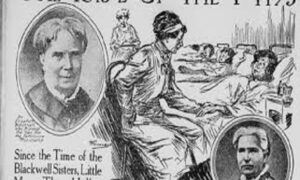Doctor Curmudgeon® If She Were Writing Now
By Diane Batshaw Eisman, M.D. FAAP Doctor Eisman is in Family Practice in Aventura, Florida with her partner, Dr. Eugene Eisman, an internist/cardiologist
Once upon a time, in 1849 Elizabeth Blackwell became the first woman in the United States to be allowed to have an MD degree.
Of course, it wasn’t easy.
My predecessor has been in my thoughts, and I wonder what she would say today.
And so, I have tried to walk in her shoes and capture what her thoughts might be.
Elizabeth might write:
It is important that you know that I was born in Bristol, England on February 3, 1821. In those days, a female physician was unheard of. How could a woman possibly achieve the degree of MD? Pshaw!
By 1832 my family had left England and we found ourselves in New York.
My family was not well-off. It was quite acceptable for a woman to become a schoolteacher. Financial support was needed and so I taught for a while.
But, I was not happy and felt myself ill-suited for teaching. My mind would wander as I tried desperately to cram knowledge into little often unwilling brains.
I had not thought of the impossible career of medicine until a close friend became horribly ill. She later told me that she felt that a female physician would have understood her, had more compassion, and given her better care.
Throughout my entire career, I endured prejudice because of my sex. It began with my medical school applications. My fingers became sore as I applied to more than ten medical schools and kept getting the inevitable letters of rejection.
Finally! I almost fainted with shock when I was accepted to the Geneva Medical College in western New York. I found out later that the male students had been queried about my admittance and they actually agreed! If even one man had voted no, I would not have been allowed to matriculate. The men agreed because they thought it was a prank of some kind. They never expected to find me and my skirts in their classroom, sitting side by side with them.
And so I became the first woman to actually get an MD in the United States.
It was a hard road, but I was fortunate to have a supportive family. Our dinner table conversations focused on the rights of women, and the abolishment of child labor and slavery—my dear father was very active in abolitionist groups.
My parents had the rare perspective of believing that each child should pursue their talents and interests, be they boy or girl.
They told me that I did not have to limit myself to teaching or domesticity.
When I graduated from medical school back in 1840, I felt I needed more education. So, I went to England and France. And of course, it continued happening. I wanted to study in hospitals and my rejections seemed to outnumber the hairs on my head. Finally, I was allowed to enroll at La Maternite’ which was a “lying-in” hospital in Paris. That was our term for a maternity hospital. I doubt you use it today. You are not afraid to use the word “pregnant.”
I was told I could work as a student midwife, but not a doctor. Even with my degree, I could not be recognized as a physician. Being a woman meant I did not have the brains, strength or skills to be a doctor.
I was quite fortunate to work under the most well regarded obstetrician of the day, Dr. Paul Dubois and he loudly proclaimed to all who would listen—that I was going to be the best obstetrician in the United States, period.
Returning to the United States and my family, I quickly found that sexism was still rampant. There were so many times when I just wanted to stamp my feet and shout, “Listen, you idiots! I am just as smart as you. I am a real, trained doctor. I just have breasts and female genitals and wear skirts. So open up your closed minds and see me as simply an excellent physician.”
I would like to present a portion of my diary which could give some insight into the difficulties and prejudice that were all around me. It was written during my time as a medical student at Geneva Medical College.
“I had not the slightest idea of the commotion created by my appearance as a medical student in the little town. Very slowly I perceived that a doctor’s wife at the table avoided any communication with me, and that as I walked backwards and forwards to college the ladies stopped to stare at me, as at a curious animal. I afterwards found that I had so shocked Geneva propriety that the theory was fully established either that I was a bad woman, whose designs would gradually become evident, or that, being insane, an outbreak of insanity would soon be apparent.” —Elizabeth Blackwell’s Diary, November 22, 1847
Dr. Curmudgeon suggests “Bitter Medicine”, Dr. Eugene Eisman’s story of his experiences–from the humorous to the intense—as a young army doctor serving in the Vietnam War.
Bitter Medicine by Eugene H. Eisman, M.D. –on Amazon
Doctor Curmudgeon® is Diane Batshaw Eisman, M.D., a physician-satirist. This column originally appeared on SERMO, the leading global social network for doctors.
SERMO www.sermo.com
Click Here to Order Boxing Interviews Of A Lifetime By “Bad” Brad Berkwitt


